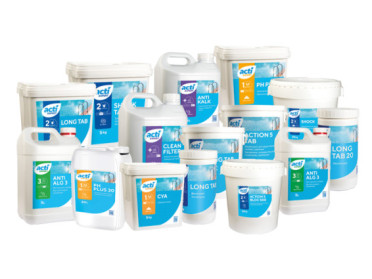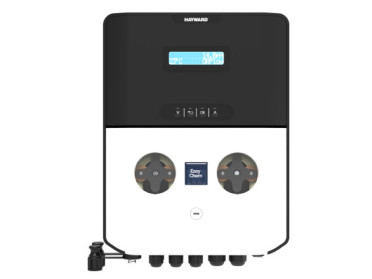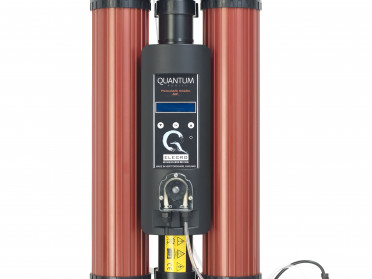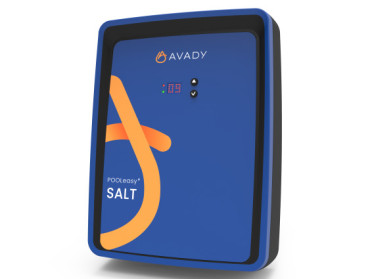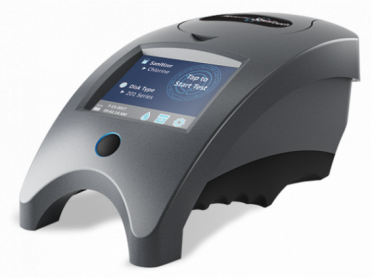Water Treatment
Your project is moving forward. You’ve now installed your pool in your garden, and you’re soon going to be able to enjoy fun, refreshing swims throughout the summer season. However, you need to take care of your pool water. This will protect the quality of both your installations and your water, allowing you to take full advantage of your pool. Discover our range of pool treatment and maintenance products.
Maintaining your pool is critical. You must take good care of your pool water, which can become polluted by swimmers or by nature. Your pool water must be regularly filtered and disinfected.
In order to keep your pool water well-balanced and clean, it must be treated correctly. To do this, you must treat your pool water using disinfectant treatment systems designed to prevent the build-up of algae, bacteria, limescale and other contaminants.
There are many different treatment products to choose from.
Chlorine treatment
Chlorine is by far the most widely used treatment, as it offers a number of advantages for your pool:
- It is excellent at killing bacteria and algae;
- It is easy to use;
- It’s a cheap way to clean and disinfect.
There can however be some unpleasant side-effects:
- It can irritate the eyes and sensitive skin;
- It can produce very unpleasant odours (if used incorrectly).
Bromine treatment
Less widely used, bromine also offers effective treatment for your pool water. It offers several advantages:
- It is an excellent alternative for people who are sensitive to chlorine;
- Unlike chlorine, it is mild and odourless;
- It is an excellent disinfectant and oxidant;
- It remains effective when the water temperature fluctuates;
- It is a long-lasting disinfectant: it disinfects the water and makes the water itself disinfectant too.
However, bromide is more expensive than chlorine.
PHMB treatment
PHMB (PolyHexaMethylene Biguanide) is a chemical product used to treat pool water. It is effective against bacteria, fungus, germs and micro-organisms.
It offers a number of advantages:
- It is an excellent alternative to chlorine treatment;
- It destroys micro-organisms and their vital substances, unlike mere oxidation;
- It is odourless, it doesn’t irritate the skin and is stable;
- It is not affected by UV light or pH variations;
- It is a long-lasting disinfectant: it disinfects the water and makes the water itself disinfectant too;
- It acts as a flocculent: it helps the water treatment system filter the water.
It does however present the following disadvantages:
- Unlike chlorine, PHMB doesn’t kill algae so you’ll need to use an anti-algae product too;
- The complex formulation makes it an expensive product to use.
Ozone treatment
Ozone is a gas which you can use to treat your pool water. It is anti-bacterial, biocidal, kills germs and disinfects your pool.
It is a powerful natural treatment option for your pool water, which improves the water quality while protecting the environment.
- It is extremely effective against bacteria, germs, organic matter and viruses;
- It provides total disinfection without damaging your pipes or other materials;
- It is twice as powerful as chlorine treatment;
- No impact on your skin;
- Reduces the chance of allergic reactions;
- It is odourless.
It is however very expensive, and is not easy to use. You’ll need to call on a professional to install an ozone treatment system.
Salt electrolysis treatment
Electrolysis is used to create chemical reactions using electrical activation energy. The fresh water in your pool passes over a salt electrolyser, and the salt turns into chlorine. The chlorine then destroys the bacteria in the water. The 2 elements then turn back into water, and return to your pool water.
It offers a number of advantages in terms of pool maintenance:
- It is effective, economical and environmentally friendly;
- The chlorine is pure and natural: no irritation or allergic reactions;
- Automatic treatment: once salted, the water treats itself;
- Very low treatment costs, despite significant investment upon installation.
UV treatment
The water is treated using a UV lamp which continually releases ultra-violet light and effectively kills bacteria, viruses and algae. In this way, the UV rays destroy the elements which pollute your water.
There are a number of advantages with this treatment method:
- It is environmentally friendly;
- The UV-C rays kill bacteria, fungi and viruses;
- It eliminates bacteria, fungi and viruses;
- Total destruction of bacteria;
- Automatic treatment;
- Non-toxic and non-chemical;
- There are no residues, unlike with chlorine and bromine treatment;
- Easy to install.
However, the water is disinfected without being disinfectant. As such, you’ll need to add a long-lasting disinfectant product. Also, UV treatment can be very expensive.

